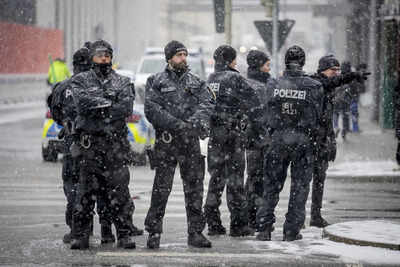German police have raised concerns that the Afghan man accused of driving a car into a crowd in Munich may have been motivated by Islamist extremism, authorities revealed on Friday.
The attack, which left dozens injured, happened on Thursday, just a day before an international security conference in the Bavarian city amid growing political tensions over immigration ahead of Germany’s elections on February 23.
According to police spokesman Guido Limmer, an initial review of electronic devices seized from the suspect suggested a “certain Islamist orientation.”
Prosecutor Tilmann also added that after being arrested, the 24-year-old, identified by local media as Farhad N, shouted “Allahu Akbar” and began praying.
Farhad N, an asylum seeker, is accused of intentionally ramming a Mini Cooper into a trade union demonstration in central Munich. Authorities say 36 people were injured, including a child and another individual who are both in critical condition. Eight others remain in serious condition.
Tilmann noted that during questioning, the suspect admitted to deliberately targeting the crowd, citing what officials summarised as a “religious motivation.”
He said that though the suspect was religious, regularly attending a mosque and posting online content with religious references, “we have no evidence to suggest that the accused is involved in any Islamist organisation such as Islamic State.”
Despite initial speculation, investigators have also found no indication that he suffered from mental health issues which might have driven his actions.
Germany ‘disturbed and bewildered’
German President Frank-Walter Steinmeier and several regional leaders visited the site of the attack on Friday, laying flowers in tribute to the victims. In a statement, Steinmeier said the attack’s “brutality” had left the country “deeply disturbed and bewildered.”
He added that it looked as if the suspect “wanted to kill and injure people indiscriminately.”
“The perpetrator is in custody and will be brought to justice in accordance with the law,” he said.
Farhad N arrived in Germany in 2016, during the height of Europe’s migrant crisis. His asylum request was rejected, but he was able to stay legally after securing work in the security sector.
Crucial election issue
The attack comes at a politically sensitive time, with immigration and security dominating Germany’s election campaign. It also follows a series of violent incidents linked to foreign nationals.
Just last month, two people, including a two-year-old boy, were killed in a knife attack on a kindergarten group in Aschaffenburg. A 28-year-old Afghan man with a history of mental illness was arrested. In December, six people died when a car ploughed into a Christmas market in Magdeburg, injuring hundreds. A Saudi suspect was arrested, with authorities suggesting he too suffered from mental health issues.
With public concerns alarming, the conservative CDU/CSU alliance, currently leading in the polls, has called for stricter immigration controls.
Meanwhile, chancellor Olaf Scholz’s government, already under pressure, has also been pushing for tougher asylum rules and faster deportations, including sending migrants back to Afghanistan.







